What follows is a spoiler laden discussion of the book Dune. Beware if you’re worried about such things.
 Winner of the very first Nebula Award for best novel, Dune is the story of a battle for one very important planet in an empire of the far off future. Arrakis, the desert planet in question, is the only known source of a vital pharmaceutical known as spice. Previously under the control of House Harkonnen, the Emperor has recently reassigned responsibility for the planet to House Atreides. Wary of this supposed promotion and with much caution, the Duke and his family move to their new home. But in spite of many precautions and plans, however, the duke’s son Paul and his mother Jessica find themselves betrayed. Will Paul be able to fulfill his destiny? And if he can, will his destiny lead the empire to a path of destruction?
Winner of the very first Nebula Award for best novel, Dune is the story of a battle for one very important planet in an empire of the far off future. Arrakis, the desert planet in question, is the only known source of a vital pharmaceutical known as spice. Previously under the control of House Harkonnen, the Emperor has recently reassigned responsibility for the planet to House Atreides. Wary of this supposed promotion and with much caution, the Duke and his family move to their new home. But in spite of many precautions and plans, however, the duke’s son Paul and his mother Jessica find themselves betrayed. Will Paul be able to fulfill his destiny? And if he can, will his destiny lead the empire to a path of destruction?
J: So one of my first impressions was that Paul was a really plain, dumb, normal, boring, and therefore jarring name.
K: Ha! I hadn’t really thought about it, but you’re absolutely right. In a book full of Gurneys and Thufirs and Stilgars, the two arguably main characters – Paul and Jessica – have incredibly “regular” names. Do you think that was on purpose?
J: Maybe.. I mean, eventually Paul stopped bothering me. Maybe I got used to it? Or maybe as he got older.. it ‘fit’ better. Or maybe because he acquired other names and titles. Jessica bothered me less, maybe because I know fewer Jessicas, or because it was more than one syllable. Or because it ended in A. But I did notice it being different from other names.
J: Paul is just a bit like… the all-powerful wizard, Tim.
K: Yeah. Though it may have been intended to show his kidness in the beginning. Just little Paul who thinks his lot in life is to be a mere Duke when actually, no, he has an even Bigger Destiny.
J: Even though I grew up with a Paul or two in school, I don’t think of kids when I think Paul. Not like.. Kevin. But anyway, yea, I can see how it might’ve been a plain name to contrast with everything he was going to do and be.
K: Considering the pretty overt religious themes in the book, choosing a biblical name was almost certainly on purpose. There are some parallels between this Paul and St. Paul, but that may be overreaching.
J: Oh.. well, I picked up on the religions, obviously. There’s a whole bit in the appendix. But I didn’t link it to some biblical allegory or anything like that. I didn’t even do that to the extent that I do it with Ender Wiggin. (Which is less than that other OSC series, or Narnia.)
J: What I mean is.. I saw the religion /within/ the book and the world. I didn’t link it at all to the world outside of the book. I mean, that the author was trying to convey something about religion. I’ll think less of it if he was!
K: Religious themes doesn’t necessarily mean allegory. I don’t believe this story was an attempt to metaphorically examine something in specific. But religion permeates the entire setting, and some of the views on religion (okay, pretty much ALL of the views on religion) here are intensely cynical.
K: It’s like, Herbert took the statement ‘religion is the opiate of the masses’ and ran with it. We have here an entire society that’s pretty much been crippled by a religious edict against ‘machines that replicate the human mind’ — making, apparently, most advanced computers illegal, and leading pretty much directly to their dependence on this one single crop for their entire empire to function.
K: The Bene Gesserit meanwhile go around seeding myths and legends on almost every world in the hopes that these legends will take root and eventually the populace can be manipulated by having these prophecies ‘come true’ some time in the future.
J: Well, the religious bits neither interested me nor bothered me. They were just sort of there. I had problems with the book on three fronts. Four if you count that I have this aversion to deserts.
K: On the other hand, I’m usually very interested when a religion is introduced in a book, and I like to see its structure and how it operates. So for me, on that front, the book was very successful. What were your problems?
J: Well, first the point of view. I’ve found I really hate third person omniscient when it’s jumping into different people’s heads. It feels like it’s treading a fine line between badly executed third person limited.
J: Like when the author does a POV shift in the middle of a scene. No, no, bad! Only in this case, he’s using it all correctly.. I just don’t like it. I don’t find it as easy to read or as engaging.
J: Which leads in to another issue I had, which is that I don’t feel attached to any of the characters. Like, at all. I can’t even believe they love people when they say they love people or even cry about it. I’m like.. yea, do you? They’re so good at being wary of everyone and lying to everyone at the same time, that I can’t trust them.
K: I don’t know that you’re really meant to. Even though we can get inside everyone’s head through the narrative, I think part of the point is that everyone’s motives are still a bit obscure. You can’t really root for anyone in this story, though Paul is probably less evil than the side he’s fighting against.
K: Part of the disconnect, I think, comes from so many things happening off camera that we’re just told about later. I was thinking about this myself — I mean, we see Chani and Paul meet, and see them start to become closer, but then we leap forward in time and it’s an accomplished fact. We miss out on a whole important section of their relationship and just have to believe that it happened. Mostly because Herbert really wasn’t very interested in that part.
J: We never see their son! At all.
K: Nope. Which completely blunts the emotional impact of what happened. But Herbert was never going to explore it anyway — we hardly even see people reacting to the deaths that happened on camera, like Duke Leto.
J: But the offcamera thing bugged me early on too in that we’re shown this whole scene with the reverend mother and the hand thing. And then, boom, next scene, we’re being told stuff that happened in that scene and I’m like.. what, when? Why didn’t you show it to us then? Grr.
K: There’s a lot of telling in this book.
J: For the first part of the story, I noticed that there was a lot of.. each scene was ‘Someone alone in a room ruminates on something. Someone else comes in.’
J: It was, room, room, room. Then they go to another PLANET and.. we don’t even get to see the ship. They’re just.. in another room.
K: Yeah, that was strange. I was honestly surprised – I read this book not too many years ago, and I had honestly forgotten that it actually starts on Calaban rather than Arrakis. They were there and packing and I was surprised. I couldn’t remember any travel. And ha ha, that’s because we didn’t see it.
J: It wasn’t until they got in a ship and encountered a worm that we finally had some interesting action going on.
J: I just had this overall impression of a person standing in a room! Like, not even /doing/ anything in particular. Just standing there. Thinking.
J: Speaking of travel, didn’t they all say.. you get addicted to the spice and you can’t leave the planet? What was that about? Because then the Baron does. And people offplanet are using the spice, some of them constantly..
K: The Baron isn’t said to be addicted to the spice. But I think what was meant to be said was it’s much easier to remain on planet as an addict, but for certain people (like the Guild navigators) as long as you have an adequate supply you should be all right. That was the impression I got anyway.
K: If you can’t afford it, you better stay where you are.
J: Hrm.
K: So I wanted to talk about the women in the book.
J: Sure.
K: The women in the book are sort of impressive and disappointing at the same time. Jessica, for instance, is a powerful fighter and highly trained. She has her own agenda and she’s able to make things happen for herself. But for all that, she, and pretty much all the remaining named female characters, are completely defined by their relationship to a man. Which was annoying.
K: I do think the book passes the Bechdel test, but only on the strength of that conversation between Mapes and Jessica about the crysknife at the beginning of the book. So it’s a questionable pass.
J: I was surprised to find women in the book, honestly. And women /doing/ things, and affecting things. Even effecting things. But yea, I did question it by the end that we have Paul’s mother, Paul’s woman, Paul’s sister.
J: Even the quotes at the start of things by Irulan. She’s still Paul’s.
K: Exactly.
K: And we also have this revisiting of a theme that for some reason is a big favorite in science fiction and fantasy: A group of women has a power, a really awesome power, and they wield it to their own advantage to make sure they have a voice in the affairs of their world/universe. But somehow their power is incomplete, weak, because no men share the power. And then, ta da, a man appears who can use the power, but even BETTER than them.
J: Gah. Now you’ve made me more annoyed with the book. :)
K: Well, to be fair, though Herbert is very much on board with this aggravating theme, I think he redeems himself a little with some very strange and random implications toward the end of the book.
J: I did wonder at the term ‘witches’, and yea, I can see how people (men) would use that term. But I really hate that it’s a term without a good male counterpart. If a bunch of men were manipulating things behind the scenes, what’re they going to be called? Not witches.
K: Yeah. And we never really meet many women who aren’t Bene Gesserit trained in one way or another, so we can’t see how they act – except at that awkward dinner party at the start of the book, which was problematic on its own.
K: Anyway, to return to my previous point about the Kwisatz Haderach business,
Paul at one point says that he can see the ‘male’ and the ‘female’ paths to vision are pretty much polar opposites. And we later learn that Count Fenring, who is a genetic-eunuch, whatever that means, was a failed attempt to create the Kwisatz Haderach. So it sort of implies that Paul is sort of straddling the male/female line, because a normal male wouldn’t be able to get at the female side of the visions in much the same way as the women can’t access the men’s.
J: That rubbish about giving and taking?
K: Yes, setting aside the stereotypicality of the giving and taking business.
J: I felt the book ended abruptly. Maybe because it was right at the bottom of the page. Does it really end with the line about concubines and wives?
J: Of all the women, I find his sister the most interesting. Even though she has the precocious little girl thing going on to the extreme.
K: Alia is interesting. I think part of your issue with the book ending so abruptly is that it really -does- end pretty abruptly. Dune is a series of 6 books, of which I’ve read the first three. And those three tell a pretty complete story. I’m not sure Dune by itself is complete.
J: If he’s supposed to be straddling this male/female line, why isn’t he more feminine? It better not be because he cried once or twice!
K: That I don’t know. But he does behave in ways that are somewhat non-male. He spends almost the entire book angsting about whether or not he’s going to start a holy war by accident. Which is odd when you get down to it, because why doesn’t he want that?
J: Good question.
K: Paul does what he does, but I never had the impression he was enjoying himself. He was resigned.
J: I guess I don’t find that odd in some types of stories. The Chosen One or even the King’s Heir.. they rarely get to do what they want. They’re martyrs, even if they don’t die.
K: I guess that’s true.
K: So that’s not odd, though I did find his -restraint- odd. He wanted to achieve goals X, Y, Z and nothing more. Period.
J: Yea, I mean, if I could see the future.. I think I’d be aiming towards the future that let me be happiest. Even if that means running away with all my women and kids.
K: I -think- he was aiming toward the future where Arrakis has free water. So I suppose in that sense, sending all of the Fremen off into space to battle would have been bad for that vision.
K: Anyway, that sort of ties in to the two main issues I found with the book. The first was the incredible stupidity of the Harkonnens over the Fremen. I think that was a huge failure. Herbert tries to make them into these wily and worthy, if completely depraved, adversaries, and yet even at the end the Baron is still claiming there are only like a dozen Fremen so how could they be a problem?!
K: Yet meanwhile, the Atreides not only knew about the Fremen and their potential, this was something they knew and planned for -before even arriving on Arrakis-.
J: I thought it was just bias coming into play, really. Oh, these desert-dwellers aren’t a threat. Oh, there couldn’t possibly be that many of them, it’s a freaking desert after all. What would they drink? What would they eat? That the Atreides saw anything was probably because the Duke was desperate at that point? I dunno.
K: To some extent I agree, but we see later that Duke Leto has correctly surmised the source of the Sardaukar’s abilities, and the Baron has to be led to it later on. So I was dissatisfied with their relative abilities. He wasn’t nearly clever enough to have had the results he did.
J: I can’t argue that.
K: My other issue was, as it has been in other books, the technology. Now, part of this is probably due to the age of the book — when Herbert wrote this, the integrated circuit was still new and computers were large and fairly primitive. So that we don’t see a lot of innovative technology here isn’t a surprise. But what is a surprise is he seemed to think there could be a spacefaring empire -without- powerful computers. Seriously? Even his invention of Mentats can’t really cover this gap.
J: Well, we don’t really see the ships. At least in this book. So maybe he could /say/ no computers, but then fell down on the job of actually showing it.
J: I think the last thing I had a problem with was I /still/ don’t understand this whole sandworm life cycle thing. The appendix in the back just made me more confused!
K: That’s atually covered extensively in the later books. Very extensively. I think the information here is adequate enough for this story.
J: Maybe it was adequate if I understood it. But I don’t.
J: It’s the pre-spice blowouts I’m not understanding the most, I think. But you don’t need to try to explain. I just want to say that I don’t think the explanation within the book was adequate. And the appendix just made things worse.
K: That’s fine. We can disagree. :)
J: The book did make me think of Star Wars and Beetlejuice, btw. Like I knew sandworms and desert planets weren’t unique to them, but did they have their source in Dune or is it not unique to Dune either?
K: That I don’t know.
K: So the last thing to look at is how well the book has held up over time. Overall, I think it holds up pretty well. The manner of writing is a bit dated — I think we’d see a lot more action if it were written today. But because he avoided technology so much (and because it takes place in such a distant future) the technology itself doesn’t seem overly dated, beyond the ‘atomics’. I did wonder, though, if the 1960s audience would have found the use of Arabic/Islamic words to be exotic. Would they have immediately conjured up real world information when read? Certainly to a modern reader these words are no longer mysterious.
J: Yea, I think the book itself doesn’t seem too dated. I probably couldn’t have guessed with much accuracy what decade it was written in. He did seem to use jihad like he expected people to know what it meant.. trying to think what the other words were..
J: Though it looks like jihad made it into the glossary.
J: Oh, hajj. Also in the glossary.
J: Then again, so did baklava. Which all kind of annoys me, since I can’t tell which words he made up or is using in a new way and which are just.. words.
K: Shaitan, I know Ramadan is mentioned at least once. Fedaykin has arabic origins.
K: Zensunni is clearly a melding of two words.
J: Something Bedwine, which may or may not have meant to refer to bedouins?
K: At one point he mentions Sharia, though the reference is a bit weird.
K: Yeah, I thought that about Bedwine, too.
K: So, that was one point I wasn’t sure about. But I’m not sure how much it matters in the end, except that it does give the words that are real more meaning.
J: I just thought to look up gom jabbar. Wondering if that was based in anything real and that reminded me… why was she testing to see if he was human? I thought there was this whole human-animal caste thing going on, or genetic thing. But then it seems to just be.. dropped? Is that gone into more in later books?
K: Hmm. I haven’t read the whole series, but it does come up again in relation to Alia, then later on in respect to some other stuff. But in terms of the Bene Gesserit and their views of the universe, there’s definitely a great deal left unsaid in this book. I believe that it ends up dropped here because after we see the test, Paul then spends the rest of the book amongst people who aren’t involved in that political world in the least.
K: In terms of Dune, I believe it’s supposed to say something about Paul, that he doesn’t operate purely on animal instinct, but on a higher plane.
K: Which is what ‘human’ means, presumably.
J: Well, so overall it wasn’t what I was expecting and wasn’t as boring as I was expecting. But I don’t know that I’m inclined to read more Dune books. I do want to watch it though.
K: I enjoyed it, and may well end up rereading Dune Messiah and Children of Dune. I don’t know if it’ll prompt me to finish reading the original series, or look into the more recently published extensions of the series.
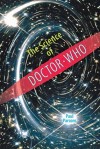 The Plot
The Plot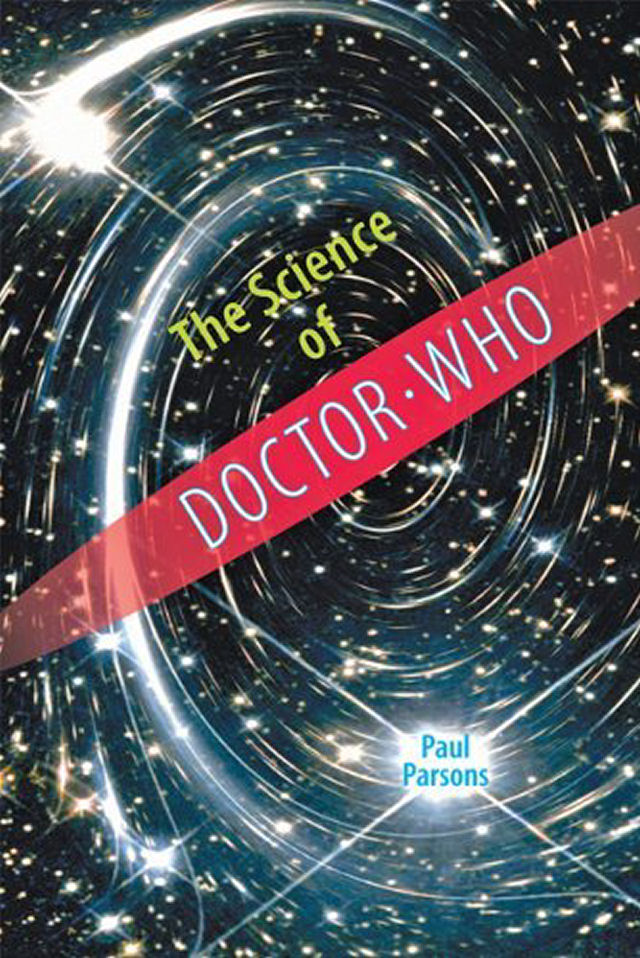

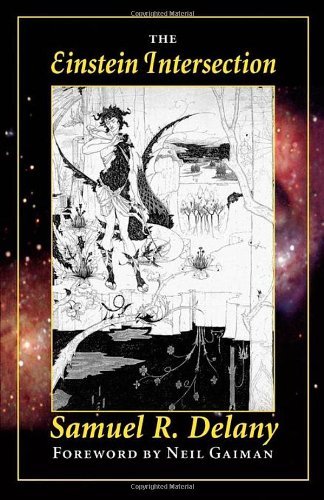
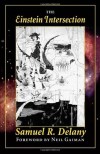 In the far distant future, Earth is no longer the domain of the human race. But a new people have arrived to live upon the surface of the planet, a people who adopt a humanoid form and human-like reproduction in order to take advantage of the environment. Lo Lobey is a member of this race, bereaved after the death of one he loves. He embarks on a journey which he hopes will end with her return from the dead.
In the far distant future, Earth is no longer the domain of the human race. But a new people have arrived to live upon the surface of the planet, a people who adopt a humanoid form and human-like reproduction in order to take advantage of the environment. Lo Lobey is a member of this race, bereaved after the death of one he loves. He embarks on a journey which he hopes will end with her return from the dead.
 Tying with Babel-17 for the Nebula in 1966, Flowers for Algernon by Daniel Keyes tells the story of Charlie Gordon, a man with an IQ of 70 who works in a bakery, and how his life changes when he undergoes a procedure to increase his intelligence. He learns to look at his former life differently, even as he tries to fit in with the people around him as his intelligence catches up to theirs and even surpasses it.
Tying with Babel-17 for the Nebula in 1966, Flowers for Algernon by Daniel Keyes tells the story of Charlie Gordon, a man with an IQ of 70 who works in a bakery, and how his life changes when he undergoes a procedure to increase his intelligence. He learns to look at his former life differently, even as he tries to fit in with the people around him as his intelligence catches up to theirs and even surpasses it.
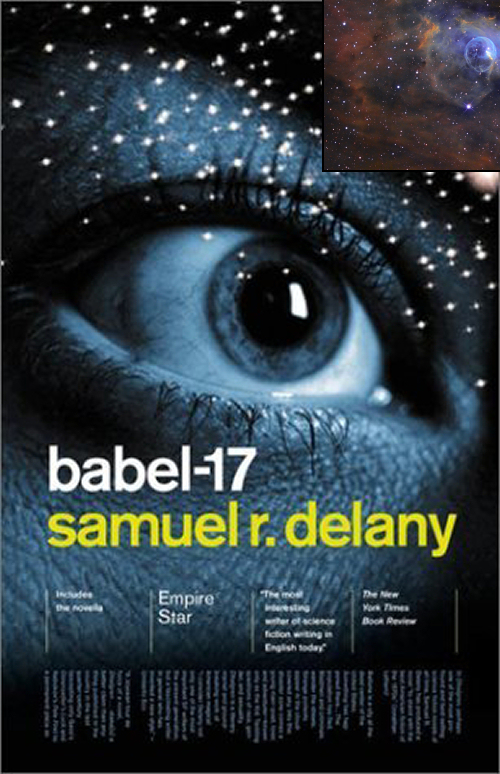
 The Alliance has been the target of a series of mysterious and troubling attacks. The military has managed to capture some chatter from the attackers, but they’ve been unable to break the code. Former analyst Rydra Wong is asked to help, though she left the service some time ago to pursue a new career as a poet. Wong brings her own unique talents to bear on the “code” and soon discovers it’s not a code at all — it’s a new and unknown language so special it can literally speed up the thoughts of anyone who uses it for thinking. But is there more to it than that?
The Alliance has been the target of a series of mysterious and troubling attacks. The military has managed to capture some chatter from the attackers, but they’ve been unable to break the code. Former analyst Rydra Wong is asked to help, though she left the service some time ago to pursue a new career as a poet. Wong brings her own unique talents to bear on the “code” and soon discovers it’s not a code at all — it’s a new and unknown language so special it can literally speed up the thoughts of anyone who uses it for thinking. But is there more to it than that?
 Winner of the very first Nebula Award for best novel, Dune is the story of a battle for one very important planet in an empire of the far off future. Arrakis, the desert planet in question, is the only known source of a vital pharmaceutical known as spice. Previously under the control of House Harkonnen, the Emperor has recently reassigned responsibility for the planet to House Atreides. Wary of this supposed promotion and with much caution, the Duke and his family move to their new home. But in spite of many precautions and plans, however, the duke’s son Paul and his mother Jessica find themselves betrayed. Will Paul be able to fulfill his destiny? And if he can, will his destiny lead the empire to a path of destruction?
Winner of the very first Nebula Award for best novel, Dune is the story of a battle for one very important planet in an empire of the far off future. Arrakis, the desert planet in question, is the only known source of a vital pharmaceutical known as spice. Previously under the control of House Harkonnen, the Emperor has recently reassigned responsibility for the planet to House Atreides. Wary of this supposed promotion and with much caution, the Duke and his family move to their new home. But in spite of many precautions and plans, however, the duke’s son Paul and his mother Jessica find themselves betrayed. Will Paul be able to fulfill his destiny? And if he can, will his destiny lead the empire to a path of destruction?